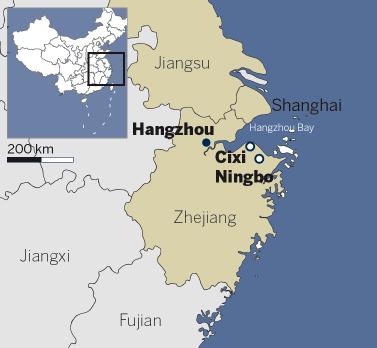 |
|
SU JINGBO/CHINA DAILY |
Now the wild seaside area has been transformed into a national-level development zone, and a growth engine for Ningbo, in the northeast of Zhejiang province.
But all this would not have been possible without the completion of the Hangzhou Bay Cross-sea Bridge, which now crosses the bay that separates the southern bank of Shanghai from the northwestern edges of Ningbo.
The 36-kilometer-long structure, the world's longest cross-sea bridge when it was finished in 2008, cut the distance between Ningbo and Shanghai to a two-hour drive and transformed Hangzhou Bay into an "enclosed lake" within the Yangtze River Delta, China's most dynamic economic hub.
But despite the massive achievement of building the bridge, the people of Ningbo still longed for something new.
So in early 2010, two development zones in Cixi county were merged to create the Hangzhou Bay New Zone, which ushered in a new industrial era for the area.
Cixi used to be the terminus for Ningbo. But after the bridge was built it became very much the moment when Ningbo was integrated with Shanghai. New business investment projects have since flocked in, changing the landscape of the 353-square-kilometer zone.
One of the most common sights on its streets has been large trucks carrying cars that had just rolled off the assembly lines, suggesting the robustness of the automotive industry, now a pillar of the zone's economy. The most important tenant so far is Shanghai Volkswagen Automotive Co Ltd.
The first phase of the Shanghai Volkswagen production base started operating in October 2013, contributing value-added output of 14.6 billion yuan ($2.4 billion) in the first 10 months of this year, according to the administrative committee of Hangzhou Bay New Zone.
In June, construction on an expanded production base was launched, promising to bring more production capacity by 2016.
In the first 10 months of this year, local industrial output grew 29 percent year-on-year to reach 81 billion yuan. Shanghai Volkswagen invested 11.7 billion yuan in the first phase of the project and plans another 19 billion yuan for the second.
Besides the automotive industry, the zone is also planning to attract the general aviation industry, with likely investment expected to add further output value of more than 100 billion yuan. Several projects are already under discussion.
The zone also plans to develop three industrial sub-areas, each with tens of billions of yuan of output value, targeting intelligent electronics, new high-performance materials and advanced equipment manufacturers. And it is cultivating areas that will focus on the cultural leisure and life and health industries, too, aiming to attract tens of millions of travelers every year.
MGM Resort International, a US hotel and casino conglomerate, said it plans to inject $5 billion into an entertainment complex.
"We are targeting leading enterprises in specific industries, and trying to lure overseas Chinese entrepreneurs back to start their own businesses here," said Ma Weiguang, Party secretary of the zone.
